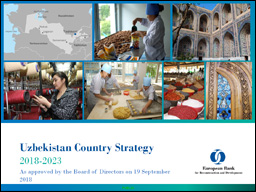LONDON (ERBD press service) — The EBRD Board of Directors has approved a new strategy for Uzbekistan which sets out the Bank’s priorities in the country for the next five years. The strategy reflects recent changes in the country’s political and macroeconomic environment and is aimed at the creation of an open, integrated and export-driven economy.
The Bank’s new phase of engagement with the country was prompted by a major reform programme launched by the government in late 2016 moving towards a more open, integrated market economic model, improving international relations, strengthening the rule of law and judicial independence and achieving the liberalisation of the foreign exchange rate. Reducing the state’s presence in the economy, improving the business environment and facilitation of foreign direct investments are among the top priorities of the Uzbek authorities.
The new EBRD strategy for Uzbekistan recognises the need to strengthen the country’s democratic institutions, expand the role of civil society, provide greater freedom to mass media and promote women’s entrepreneurship. The Bank will also continue monitoring progress on the eradication of forced and child labour in sectors such as the cotton growing industry.
The EBRD’s operational and strategic priorities in Uzbekistan will be based on the following three pillars:
- Enhancement of competitiveness by strengthening the role of the private sector: The EBRD will mobilise financial and consultancy resources to support small and medium-sized businesses. The Bank will help develop local capital markets and strengthen domestic financial institutions. It will provide pre-privatisation support to selected state-owned enterprises and look at ways to improve Uzbekistan’s investment climate.
- Promotion of green energy and efficient use of resources: The EBRD will help develop sustainable solutions for municipal and national infrastructure sectors. It will help promote green investments to reduce carbon intensity, channel resources and provide know-how to unlock the country’s renewable energy potential. Special attention will be paid to energy security, which will include efficient and sustainable power generation, transmission and distribution. The Bank will also use its expertise to help with uranium remediation.
- Support increased regional and international cooperation and integration: Together with other international financial institutions the EBRD will work on the improvement of the country’s transport infrastructure and ways of promoting its commercialisation and better connectivity with regional networks. It will also stimulate private businesses involvement in the sector. The EBRD will support regional energy cooperation, including networks. The Bank’s Trade Facilitation Programme (TFP) will help mobilise the export activity of Uzbek businesses and financial institutions. The Bank is planning to explore opportunities and support investments related to the country’s cultural heritage in order to improve corresponding infrastructure and tourism potential.


